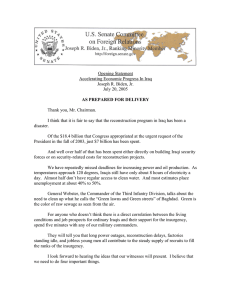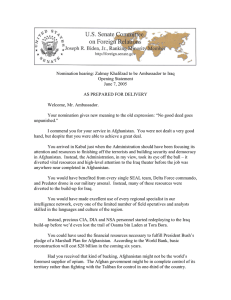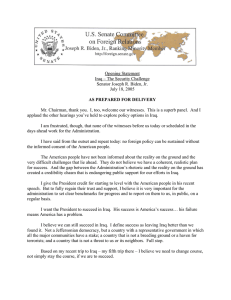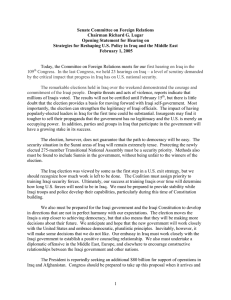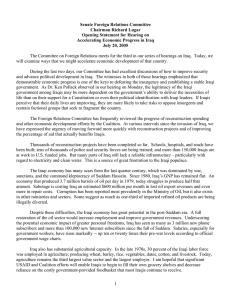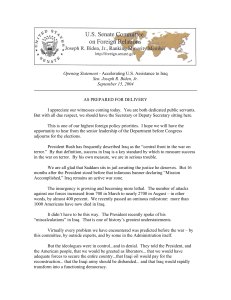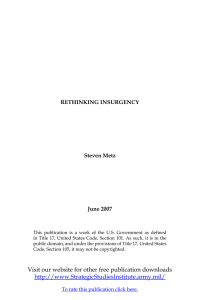United States Senate Committee on Foreign Relations
advertisement
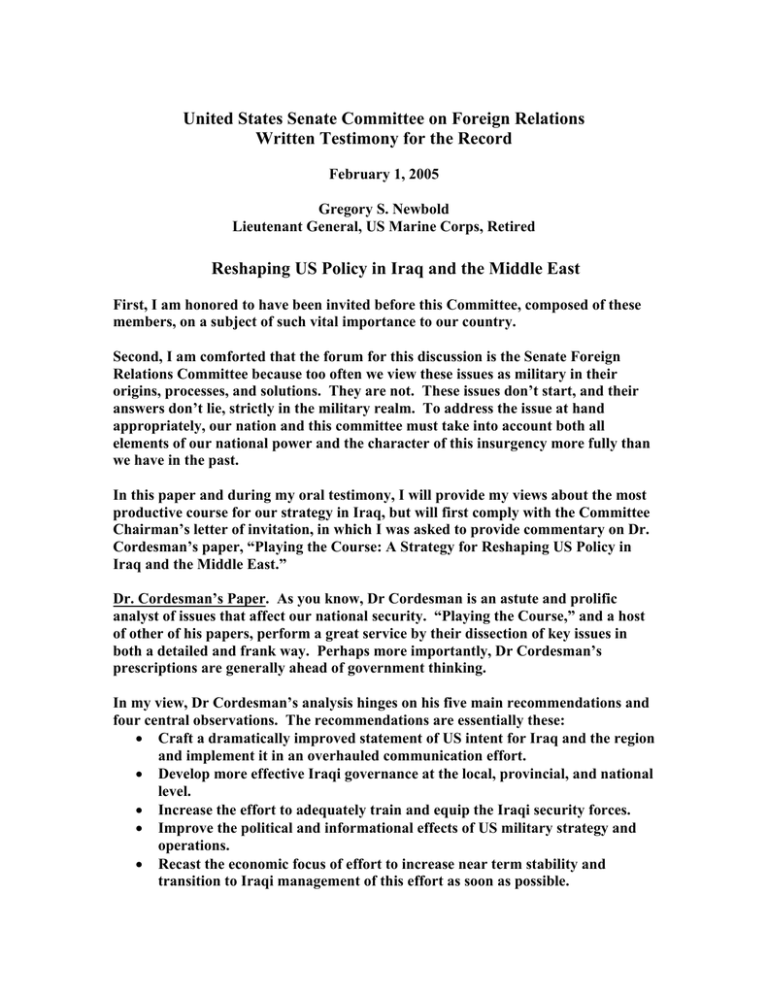
United States Senate Committee on Foreign Relations Written Testimony for the Record February 1, 2005 Gregory S. Newbold Lieutenant General, US Marine Corps, Retired Reshaping US Policy in Iraq and the Middle East First, I am honored to have been invited before this Committee, composed of these members, on a subject of such vital importance to our country. Second, I am comforted that the forum for this discussion is the Senate Foreign Relations Committee because too often we view these issues as military in their origins, processes, and solutions. They are not. These issues don’t start, and their answers don’t lie, strictly in the military realm. To address the issue at hand appropriately, our nation and this committee must take into account both all elements of our national power and the character of this insurgency more fully than we have in the past. In this paper and during my oral testimony, I will provide my views about the most productive course for our strategy in Iraq, but will first comply with the Committee Chairman’s letter of invitation, in which I was asked to provide commentary on Dr. Cordesman’s paper, “Playing the Course: A Strategy for Reshaping US Policy in Iraq and the Middle East.” Dr. Cordesman’s Paper. As you know, Dr Cordesman is an astute and prolific analyst of issues that affect our national security. “Playing the Course,” and a host of other of his papers, perform a great service by their dissection of key issues in both a detailed and frank way. Perhaps more importantly, Dr Cordesman’s prescriptions are generally ahead of government thinking. In my view, Dr Cordesman’s analysis hinges on his five main recommendations and four central observations. The recommendations are essentially these: • Craft a dramatically improved statement of US intent for Iraq and the region and implement it in an overhauled communication effort. • Develop more effective Iraqi governance at the local, provincial, and national level. • Increase the effort to adequately train and equip the Iraqi security forces. • Improve the political and informational effects of US military strategy and operations. • Recast the economic focus of effort to increase near term stability and transition to Iraqi management of this effort as soon as possible. Dr Cordesman’s four central observations – as extracted by me – that I will use as the basis for my comments are these: • The odds of a successful outcome in Iraq are about even. • The US has to seize upon the opportunity to declare victory and withdraw as soon as possible – probably by the end of 2006. • The US must see the conflict in broader terms than we are now. The US must implement regional policies that bring due credit to us, and we must see the conflict in ways that can address the root causes of terrorism and the clash of cultures. • The US must free itself from hindrances to its strategic freedom of action imposed by dependence on Middle Eastern oil. First, I agree with Dr Cordesman’s recommendations and observations without caveat or criticism. They are correct. To be useful to this committee, though, I will reinforce specific points that I think are crucial to a meaningful analysis, and offer some additional specificity in recommendations that I think should be fundamental elements in a re-crafted US strategy. My reinforcement of Dr Cordesman’s recommendations is based on my own thoughts: • Our public diplomacy/information operations have been poor throughout the last several decades and are distinctly not up to the task today. • Our regional policies are almost universally viewed as one-sided, and our credibility on almost every other issue is undermined by this fact. • We had a poor to non-existent plan for the post-invasion phase, and are now reaping what we sowed. In fact, failing to correct the conditions that resulted in poor planning may doom us to repeat them. • The US military has performed magnificently and heroically – not because of the strategy, but in spite of it. • We have focused overly on the military as a tool to contain the insurgency, and have been woeful in providing the other elements of national power that are needed in at least equal measure. • At the national level, we are deluding ourselves in many key ways – examples are the public assessments of the state of training of the Iraqi forces and police, the underlying nature of and prospects for the insurgency, the degree to which we truly have an international coalition in support, and in the strategy for adequately addressing the root causes of terrorism, radical Islam, and instability in the region. First, as I see the fundamental reality -- we are facing a tough, resilient insurgency that has no end in close sight. We’ve had over 10,000 casualties and over 1000 deaths, and by now we should know whether our strategy has a realistic chance of creating appropriate conditions in Iraq and bringing our troops home. In my view, five years of this is unsustainable in what it will cost us materially (our most patriotic young citizens), economically, diplomatically, and politically. We should not accept five years of what we are experiencing now. No matter whose strategy is adopted, it ought to set at its goal a termination within two years. Better to surge now – with whatever that costs us – than to bleed for five years. A fundamental weakness in my view, and one we must correct, is that we continue to view Iraq overwhelmingly from an American perspective. (This is not a phenomenon unique to this Administration, and was equally a characteristic of the previous one.) Two examples in the current crisis are illustrative of our myopia. The first is that we define a satisfactory political outcome – federalism and democracy – in ways that are more realistic for Iowa than for Iraq. The dream is correct and noble; the standards for near term attainment are unrealistic. The second is that we view the insurgency as a military problem that can be defeated principally by killing more insurgents. In the past six months we’ve killed thousands of insurgents and inflicted significant defeats on them at Fallujah, Samarra, and Najaf – and by our own estimation the insurgent ranks have grown from 5,000 to 20,000. What is most troubling is that I have yet to see or hear of a government assessment that adequately describes what motivates thousands of young and old, male and female, Sunni, Shia, and Kurdish Iraqis to attack us with suicidal fervor. The basic primer in all of the service war colleges instructs you that you cannot formulate an effective strategy for an insurgency, if you have not adequately assessed its root causes. As it stands now, we think of the problem and the target as the insurgents; rather than what creates the insurgents. We attack the insurgents, rather than what produces them. Iraq is now fractionalized; some discord and factional fighting are part of its future. If we departed peremptorily, the cost to Iraq, the region, our credibility, and probably to our national security, would be severe. Pared to its core, though, our central problem is that our attempts to stabilize the country are being undermined by the insurgency – and the fundamental reason for the insurgency is that we are occupying Iraq. It does not matter how nobly we view our presence; what matters is that the absolutely overwhelming view of Iraqis (and of others in the region) is that we are occupiers. Worse, in their view, we are Western infidels there only to control oil. Their recruiters are having a good deal easier time than ours. The irony of our occupation is simple, but profound – there is no stability without us, but our presence inflames the insurgency that causes instability. The trick, then, is to craft a strategy that neutralizes the rationale for the insurgency – the chief complaints that drives the active insurgents and their supporters to and their supporters to violence – while strengthening the stake of the ordinary Iraqi in a future tied to the legitimate government. A re-crafted strategy must be far bolder and broader than has been initiated thus far. Thus far, we have attempted a military defeat of the insurgents, augmented by weak efforts to improve the material condition of the Iraqis. As Dr Cordesman points out, only a small portion of funding for infrastructure, security, and quality of life improvements have been spent. The ordinary things that most symbolize a life with hope – jobs, electricity, clean water, security, and sewage and trash removal are not ordinary enough. Coalition military training teams operated throughout the provinces, while training teams to assist in governance, economics, and information dissemination are scarce outside of the capital. Our troops have performed with distinction, but they can’t do it all. We have an opportunity to seize important initiative with the significant success of the election, but the momentum we gained can be transitory if not reinforced. The theme to a reinvigorated strategy should address root causes, and be no more complicated than dramatically enhanced incentives and disincentives (“carrots and sticks”) that make clear that the dreams and aspirations of ordinary Iraqis lie with the new Iraqi government, and the insurgents are the enemy of their hopes. Where we need to sustain and augment the effort: In The Security Realm. While we strike insurgent forces and keep them off balance, we must give full weight to Gen John Abizaid’s call for a dramatically enhanced force to train the Iraqi Army. The National Guard proved to be largely useless in the Sunni areas, and our main efforts have to focus on the more promising Iraqi Army. We also need our European allies immediately to fulfill their promise to help train Iraqi security forces. We must ruthlessly overcome the inertia that has taken over a year and a half to provide only half of what is needed to fully equip the Iraqis security forces. Soon, we are going to lose a portion of our allies on the ground, and we need to replace them as the need arises. Finally, if we don’t want the insurgency to drag on for five years, we need to be ready to surge adequate forces to dominate restive areas like Mosul and Ramadi. We have operational momentum, and we ought to exploit it. Where we need to overhaul our effort: In The Political Realm. Our diplomatic and political efforts pale in comparison to our military ones. Our political assistance is almost completely restricted to Baghdad, while the insurgency will be won or lost in the outlying areas. We should implement a regionalization strategy that empowers the more stable provinces and motivates the restive areas to change, consistent with a carrot and stick approach. To the stable areas, we should offer increased financial assistance, less Coalition presence, and greater autonomy is disbursing aid. This strategy won’t work, however, unless the benefits are exaggerated enough to encourage emulation by those who don’t have them. Alternatively, the restive areas would receive restricted amounts of aid, less autonomy, and more Coalition force presence because they would be augmented by those who are released from duty in the stable areas. Those in the unstable areas need daily reinforcement that a better life ensues when the area is stable. When the people believe this, the insurgents lose their protective cloak and their support network. In The Economic Realm. As Dr Cordesman points out, our inability to dispense appropriated funds where they are needed is nothing short of astounding. To a significant degree, the inability to improve the daily lives of the Iraqi citizen is our biggest failure, and one of the biggest sources of dissatisfaction. We need to create or restore basic human services, and we need to establish jobs. If we don’t dramatically alter the speed at which we are dispensing aid, all other efforts may be moot. The CETA funds, by which military commanders have been able to fund projects that improve the quality of life for Iraqis in their area, ought to be an immediate and active model for other agencies. In The War Of Public Opinion. By any poll, scientific or otherwise, we have performed dismally in attempting to win hearts and minds. [This almost seems to be an American cultural deficiency, because this trait has been symptomatic for generations of administrations.] But beyond our inability to grasp and articulate the themes that resonate most heartily with the various groups in Iraq, we have little to advertise. If root causes are important, then we need to find the ways to neutralize them. When the reasons are material – quality of life issues – then we need to work to address them, and advertise our success. Solutions here were previously discussed. The more difficult situation, though, occurs when the root cause of violent opposition to our forces, is our forces. To legions of Iraqis driven by what we would call nationalism, the cause is simple – they are an occupied country. Since the issue most fueling the insurgency is our presence, we need to shift responsibility/ blame for our current presence to the insurgents. Simply communicated, we would probably have withdrawn by now, if not for the actions by the insurgents. And, we could make a fairly speedy withdrawal now, if not for insurgent actions. The key to success in the war for public opinion is that we need to be able to discuss what would happen with success. This approach must be a unified front with the newly elected Iraqi leadership. In my view, closed mindedness about discussing anything except that our withdrawal is wholly “condition based,” fuels the perception that we have no intention of withdrawing. To be sure, we don’t need or want precise timelines, but we ought to imaginative enough to provide examples of what could happen if the insurgency was measurably suppressed and the Iraqi Army was stronger. We must be utterly convincing that the length of our stay can be short or long – and it is entirely dependent on the violence currently tolerated by the silent majority of Iraqis. An Example – Our goal is to leave Iraq a stable country, able to administer to its own needs and security. This is not now possible. Should the insurgency wane significantly, however, you might expect to see reduction in US and Coalition forces by the end of the year. If, on the other hand, the insurgents refuse to respect the will of the Iraqi people and its government, we would be compelled to remain until conditions permitted a beginning to our withdrawal. We would prefer to begin a withdrawal, but apparently the insurgents are not willing to see either our departure of the government of the Iraqi people succeed. Continuing the example, if the insurgency were to be assessed as “controlled and of minor consequence” by the end of 2006, there would be no reason for continued US presence in Iraq – other than those minor forces requested by the Iraqi government to assist in training the new Iraqi Army. Such a withdrawal, though, is entirely dependent on the ability of the Iraqi Army to provide reasonable security. If the insurgents continue to disrupt the daily lives of Iraqis and their attempt at democratic government, and the government requests our continued operations, then we would have no choice but to stay. We have a chance to build on the success of Sunday’s elections, and future demonstrations of democracy in Iraq, by undermining the legitimacy of those who violently oppose us. To exploit this success, though, we need to demonstrate more honesty in self-appraisal, and greater flexibility and imagination in implementation, than we have to date. We cannot accept further delays in administering the political, economic, and public information aspects of our strategy, because the cost will ultimately be measured in young Americans. We should set goals for how long we want to sustain this effort, and take the actions that provide a real opportunity for making them achievable. This will take flexibility among our key decision-makers, and a willingness to exploit alternative views and options – neither have been the norm.
